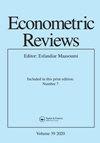有限种群中的推断和外推,特别注意聚类
IF 1
4区 经济学
Q3 ECONOMICS
引用次数: 0
摘要
摘要经济学中的统计推断通常是基于假设无限人口的公式。我们提出了从有限总体中采样时使用的适当公式,并特别注意治疗效果和聚类问题。是否应用有限总体校正的问题通常很微妙,适当的校正可能取决于难以观察的参数,使研究者只能对相关的估计方差进行限制。本文章由计算机程序翻译,如有差异,请以英文原文为准。
Inference and extrapolation in finite populations with special attention to clustering
Abstract Statistical inference in economics is commonly based on formulas assuming infinite populations. We present appropriate formulas for use when sampling from finite populations, with special attention given to issues of treatment effects and to issues of clustering. Issues of whether to apply finite population corrections are often subtle, and appropriate corrections may depend on difficult to observe parameters, leaving the investigator only with bounds on relevant estimator variances.
求助全文
通过发布文献求助,成功后即可免费获取论文全文。
去求助
来源期刊

Econometric Reviews
管理科学-数学跨学科应用
CiteScore
1.70
自引率
0.00%
发文量
27
审稿时长
>12 weeks
期刊介绍:
Econometric Reviews is widely regarded as one of the top 5 core journals in econometrics. It probes the limits of econometric knowledge, featuring regular, state-of-the-art single blind refereed articles and book reviews. ER has been consistently the leader and innovator in its acclaimed retrospective and critical surveys and interchanges on current or developing topics. Special issues of the journal are developed by a world-renowned editorial board. These bring together leading experts from econometrics and beyond. Reviews of books and software are also within the scope of the journal. Its content is expressly intended to reach beyond econometrics and advanced empirical economics, to statistics and other social sciences.
 求助内容:
求助内容: 应助结果提醒方式:
应助结果提醒方式:


